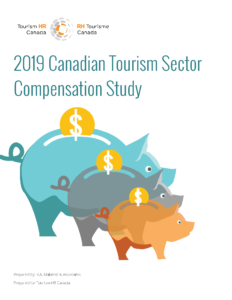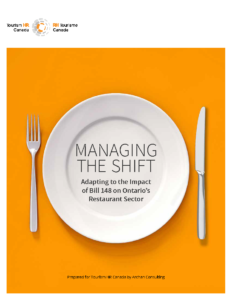
Is Your Pay Competitive? 2019 Tourism Sector Compensation Study Now Available
Employers in Canada’s tourism sector want to know they are offering competitive compensation strategies, just as workers and labour organizations want to know that they are receiving them. Having sound compensation data will help the tourism sector support a dynamic and balanced labour market.
Produced with R.A. Malatest and Associates, this comprehensive study presents data and analysis on the compensation and benefits offered by businesses in Canada’s tourism sector. Over 2,100 employers from across the country provided data for over 48,000 employees in food and beverage services, accommodation services, recreation and entertainment, and travel services.
The study contains information on the type of compensation (e.g., hourly or annual), salary range, median salary, and bonuses for 30 occupations in the sector. This data is broken down by region, industry group, employment status (full-time, part-time, seasonal), and union status.
The study also includes data on businesses’ policies around gratuities, benefits, perquisites and incentives. Additionally, in response to the changing landscape of compensation across the country, the study collected data on the impact of minimum wage increases on businesses in the sector.
Respondents were optimistic about the health of the sector. Overall, tourism businesses reported an increase in revenues in 2018 over the previous year. When asked about future demand, 21.9% expected to increase the size of their workforce in 2019, compared to only 6.3% who expected their workforce to shrink.
Understanding trends in compensation will help employers attract and retain the talent needed to continue to grow the sector and compete on an increasingly crowded global stage. The information contained in the Canadian Tourism Sector Compensation Study is essential for the development and implementation of consistent and effective human resource strategies. The data will help all tourism stakeholders set pay policies, develop evidence-based human resource strategies, and analyze competitive practices.
Access your copy of the 2019 Canadian Tourism Sector Compensation Study now.
 Managing the Shift: Adapting to the Impact of Bill 148 on Ontario’s Restaurant Sector
Managing the Shift: Adapting to the Impact of Bill 148 on Ontario’s Restaurant Sector
In late 2017, Ontario passed new legislation (the Fair Workplaces, Better Jobs Act, also known as Bill 148) that made a total of 64 changes to Ontario’s labour and employment laws. This included a January 1, 2018, increase of its general minimum wage from $11.60 to $14.00 per hour and its liquor server wage from $10.10 to $12.20 per hour.
Managing the Shift: Adapting to the Impact of Bill 148 on Ontario’s Restaurant Sector analyzes the responses of over 300 restaurants to an Ontario-wide survey of full- and limited-service restaurants on the impact of the new legislation, with a focus on independently owned businesses.
Download [popup_anything id=”5397″] to examine the effects of Bill 148 on three key areas in Ontario’s restaurant industry:
- Labour markets
- Managerial and operations issues
- Profitability
Also available: two infographics to help visualize the highlights of the report.
Ontario Restaurants 2018: The Fair Workplaces, Better Jobs Act
Bill-148 Impact of Labour and Staffing in Ontario Restaurants
